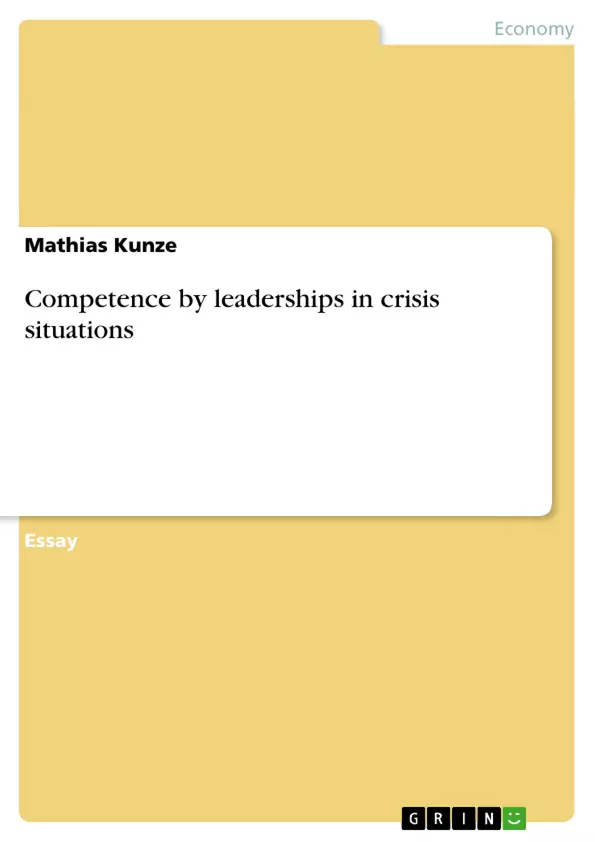Nowadays, company crises are the everyday life. The developments show that not only small but also medium-sized companies and even corporate groups are effected: breaches of company rules at Siemens and Volkswagen, SARS at Lufthansa or products recall at Haribo. These situations are not only big challenges for the management but also for the creditors and employees. Therefore the highest priority is to restore the competitiveness of the company.
Usually, company crisis does not appear suddenly but there are already important warning signals in the forefront of the crises. If these warning signals are ignored and different determinants like the following of a conservative, centralistic and autocratic leadership, intransparency of production costs or a missing controlling system are cumulated, there is a danger for a crisis. An essential cause for company crisis is a bad qualification of the management in combination with missing problem solving competence within the deciding process of the management level. Therefore, the management needs to be qualified by leadership skills in order to react in the right way on warning signals for crises.
This working paper shows what competences managers in companies affected by crises need. First it is important to present the basics of a company crisis. The working paper describes the types, causes and consequences of company crises, and the typical process of crises. Later, different competence approaches are presented being important for each modern manager as a company crisis can affect each company any time.
Inhaltsverzeichnis (Table of Contents)
- Introduction
- Basics of a Company Crisis
- Types, Causes and Consequences of Company Crises
- Typical Process of Company Crises
- Competence Approaches of Leaders during Company Crises
- Conclusion
Zielsetzung und Themenschwerpunkte (Objectives and Key Themes)
This working paper focuses on the importance of leadership competence in managing company crises. It aims to provide a comprehensive understanding of the nature of company crises, including their types, causes, and consequences, as well as the typical process they follow. Furthermore, the paper will explore different competence approaches that are crucial for effective leadership during these challenging situations.
- Types and Causes of Company Crises
- Consequences of Company Crises
- Importance of Leadership Competence in Crisis Management
- Different Competence Approaches for Crisis Leaders
- Warning Signs and Risk Factors Contributing to Crises
Zusammenfassung der Kapitel (Chapter Summaries)
- Introduction: The introduction underscores the increasing prevalence of company crises in the modern business environment, highlighting how they impact not just companies, but also creditors and employees. It emphasizes the crucial role of leadership in crisis management and restoring a company's competitiveness, specifically emphasizing the need for competent management to recognize and respond effectively to early warning signals.
- Basics of a Company Crisis: This chapter delves into the definition and characteristics of company crises, exploring their various types and causes. It discusses the distinction between endogenous and exogenous crises, highlighting the importance of understanding the origins of crises for effective management. The chapter also explores the concept of "multi-localities," emphasizing that crises often stem from a combination of internal and external factors.
- Types, Causes and Consequences of Company Crises: This section provides a detailed analysis of different types of company crises, including growth crises, stagnation crises, decline crises, and crises caused by internal and external factors. It discusses the critical importance of recognizing warning signals and understanding the potential consequences of failing to respond effectively. The chapter also highlights the role of management decisions in causing crises, emphasizing the importance of proactive and informed leadership.
Schlüsselwörter (Keywords)
This working paper focuses on company crises, leadership competence, crisis management, warning signals, risk factors, types of crises, causes of crises, consequences of crises, competence approaches, and effective leadership in challenging situations. It explores various aspects of crisis management and provides insights into the essential role of leadership in navigating these complex situations.
Frequently Asked Questions
What are the primary causes of a company crisis?
Company crises often stem from poor management qualifications, ignoring early warning signals, autocratic leadership, and a lack of transparent controlling systems.
What are typical warning signs of an impending crisis?
Warning signs include declining sales, intransparency in production costs, high employee turnover, and the failure of management to adapt to market changes.
What is the difference between endogenous and exogenous crises?
Endogenous crises are caused by internal factors (e.g., bad decisions), while exogenous crises are triggered by external events like economic shifts or global pandemics.
Which leadership skills are essential during a crisis?
Leaders need high problem-solving competence, transparent communication, emotional intelligence, and the ability to make decisive actions under pressure.
What are the different stages of a company crisis?
Crises typically progress from a strategic crisis to a profit/earnings crisis, and finally to a liquidity crisis which can lead to insolvency if not managed.
- Quote paper
- Mathias Kunze (Author), 2008, Competence by leaderships in crisis situations, Munich, GRIN Verlag, https://www.grin.com/document/89003



